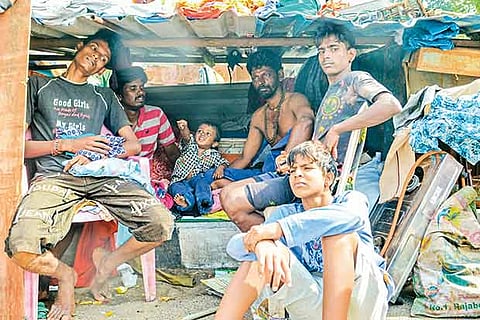

Chennai
The city is battling the after-effects of unprecedented floods, but very few professionals are equipped to handle people’s often fragile or fragmented state of mind. Like medical first aid, mental health first aid attempts to provide first aid in a mental health crisis by improving knowledge, eliminating stigma and empowering people to be able to positively help a person.
An ignored, but important side
R Manoj, clinical psychologist, says that the disaster relief programme leaves out the psychological aspect completely. He adds that NGOs involved in the disaster management programme are ill-equipped. He points out that such a state of mind —depression or helplessness — is a fall-out of any disaster and it can affect people across income groups. He adds, “The distress is the same for anyone losing a family member or incurring a huge loss during times of a calamity such as the one we have seen. The impact of post-traumatic stress disorder can be seen even after a long time.”
Train more people
Psychologist Dr Mini Rao says that in a country with a large population like India, the number of psychological experts is abysmally low. Experts suggest that roping in more people who are interested in first aid will help in meeting the requirement. Dr Lakshmi Vijayakumar, psychiatrist and founder of the suicide helpline Sneha, adds that volunteers can be trained under guidelines promoted by the World Health Organisation. Manoj adds, “We can have short-term courses for those interested and programmes, like NSS and NCC and can train students.”
Dr R Mangala, consultant psychiatrist, Schizophrenic Research Foundation (SCARF), Chennai, says that volunteers on the field can be trained in emotional first aid. “We hear about people affected in the floods being unruly and rude. These can be seen as manifestations of stress. One needs to know how to deal with such cases. They don’t have to be psychologists, but can be trained in the basics,” she says. B Sudhakaran, Assistant Professor, Institute of Mental Health, says that a huge difference could be made with awareness and clear policies. Dr Mini adds, “Sometimes, amateurs step in. They don’t offer the right guidance and are not in the picture after the relief work. That is more detrimental.”
When it matters
While the aftermath of any disaster involves immediate rehabilitation of those affected, the psychological part comes after the basic requirements are met. Dr Mini says, “Immediately after a disaster or tragedy, the person is hopeless, aggrieved and even confused. Any intervention at that time wouldn’t be suitable.”
Dr Lakshmi Vijayakumar, who has seen a few cases after the flood, says a person’s state of mental health can be assessed only a few weeks after the tragedy. Perspective is at the core of such first aid, says Sudhakaran. “A clear goal can make the task more effective.
Emotional first aid
Connect. Make contact. Reach out, talk to them. Notice their pain.
Listen. Take the time and really pay attention. You don’t have to have all the answers. Just listen.
Understand. Nod, pay attention, let them know you appreciate what they are going through.
Express Concern. Say that you care, you are worried, and you want to be helpful.
Seek Help. Tell them you want to go with them to talk to a third person, preferably an adult with experience and the ability to help. Don’t agree to be secretive. Enlarge the circle of support
Courtesy: Mental Health And You (MHAY)
SCARF launches helpline
The organisation has launched two helplines for volunteers to get in touch with for any assistance relating to emotional first-aid, when they are on the field. Contact: 9445040236/ 9789007934.
Visit news.dtnext.in to explore our interactive epaper!
Download the DT Next app for more exciting features!
Click here for iOS
Click here for Android